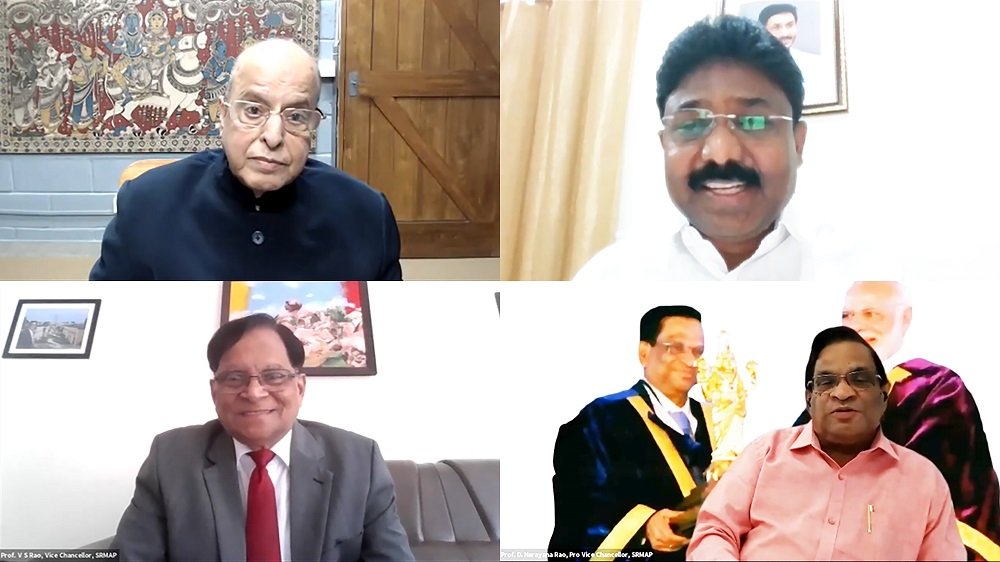NEP-2020 to provide Holistic, Student – Centric, Flexible and Multidisciplinary Education

Amaravati, July 24
On July 29, 2020, the National Education Policy 2020 (NEP 2020), came into force by the Government of India. SRM University-AP organised a sought-after webinar titled “Creating a Vibrant Knowledge Society – An Indian Strategy for 21st Century” on July 24, 2021, as a part of its University Distinguished Lecture Series. Padma Vibhushan Dr. K Kasturirangan, Chairman, National Education Policy-2020 (NEP), expounded the salient features and importance of the National Educational Policy. Dr. Audimulapu Suresh, Hon’ble Minister for Education, Andhra Pradesh, and Prof Vijayalakshmi Saxena, General President, ISCA, delivered special addresses.
Prof. D. Narayana Rao, Pro-Vice-Chancellor, SRM University – AP in his welcome address said that the NEP – 2020 laid the foundation for a new India of the 21st Century. He said that NEP is poised to yield outstanding results in the fields of Higher Education, Research, Innovation, and Science & Technology Development in the country. Prof. Narayana Rao said that NEP 2020 is a game-changer for education in the country. He also opined that no country has achieved self-reliance without education of high quality.

In his Presidential Address, Dr Adimulapu Suresh expressed his happiness to share the various initiatives that the Government of Andhra Pradesh is taking towards implementing National Education Policy-2020. Dr. Suresh said that the Government of Andhra Pradesh, under the leadership of Hon’ble Chief Minister YS Jagan Mohan Reddy, has accepted the concept and recommendations of National Education Policy-2020 that it has envisaged. He agreed that education should have equality, accessibility, affordability, accountability, and reachability among all. In the 21st century, poverty can no longer be a barrier to education. Hence, the Government of Andhra Pradesh has introduced several novel programmes and schemes to bring education to everyone, and NEP-2020’s recommendations have aided to take their schemes forward. The Government of Andhra Pradesh believes that mothers are the key to an educated family. Therefore, the Government has introduced an incentive programme for mothers. Every mother who sends her child to a school will get 15000 rupees from the Government of Andhra Pradesh. The Government has further introduced Full Fee Reimbursement for the students below poverty level. Dr. Suresh proclaimed, “People who were denied education for centuries now can find their voices. Not a single child will be denied education. Hence, the Government of Andhra Pradesh has allocated 17% of its budget, i.e. nearly thirty thousand crores, for education. We are currently spending 2-3% of GSDP for education which is very close to what has been prescribed in the NEP-2020. Following the recommendation of NEP-2020, The Government of Andhra Pradesh is also introducing Academic Banks of Credits (ABC) and Choice based credit system (CBCS) to provide students with freedom and flexibility in education.” Dr Suresh further mentioned that NEP-2020 emphasizes Higher Education but does not enlighten much on Primary Education. CM YS Jagan Mohan Reddy has taken revolutionary steps to reconstruct Primary Education, developing the common curriculum and language training. Along with that, The Government is also putting an emphasis on Communicative and Soft Skill Training. Therefore, the Government of Andhra Pradesh can proudly say that that they have been the first state in the nation to imbibe the recommendations of National Education Policy-2020.
Dr. Vijayalakshmi Saxena, in the Special Address, further elaborated that the previous policy on education was decades old. With the changing time, the policy also needs to be improvised. NEP-2020 has filled the void and came up with suggestions for the making of the 21st century. She said, “As educators, it is our duty to bring youngsters to take up new challenges. The vision of Indian Education, as mentioned in the policy, is to touch everyone’s life, consistent with their needs and necessities. she concluded.
In his Distinguished Lecture, Dr. Kasturirangan asserted that over the next decade, India would have the highest population of young people in the world, more than 50% below the age of 35 years aspiring for high-quality education.
“How to learn? Moreover, how to become lifelong learners?-This is a critical question that needs to be addressed appropriately. Furthermore, the education of the future generations needs to be reconfigured to meet the targets of the sustainable development goals set for the year 2030. Especially goals for quality education seek higher inclusion, equitable quality education and promotion of lifelong learning opportunities for sustainable economic growth, full and productive employment and decent work for all,” explained Dr. Kasturirangan.
Dr. Kasturirangan further delineated, “India now needs an education system aligned with the aspirational goals of the 21st century while remaining rooted to India’s values, systems, and ethos. NEP-2020 is crafted to provide an integrative yet flexible approach to education, keeping the interconnections of various phases of education. NEP-2020 is an end-to-end educational roadmap for the country with a broad view of encompassing holistic development, kindling the true potentials of the individuals. The policy is designed in accordance with developmental, cognitive and educational psychology, indicating that 5+3+3+4 design is better suited to a child’s learning trajectory.”
Dr. Kasturirangan further explained the role of universities, degree colleges, the importance of open and distance education, and the role of teachers. Teachers are the pillars of the successful implementation of NEP-2020. The new policy has facilitated the teachers and revised their roles to achieve the goal.
The major emphasis given in the policy is to the aspect of holistic and multidisciplinary education as the fundamental component of every level of education. Universities are perennial sources to generate and disseminate new ideas and knowledge. These are the effective eco-systems for interactions among diverse disciplines. He further requested SRM University-AP to consider setting up a Centre of Excellence in Education to offer B.Ed and M.Ed courses to prepare teachers. Dr. Kasturirangan said that the teachers trained in universities amongst the passionate and high profile Professors, will be excellent teachers and excel in teaching. Thus, the Universities need to take the initiative of setting up Centres of Excellence in education. At the Post-graduation level, one of the key recommendations of the policy is the strengthening of the research at the university system. The policy recommends the creation of a National Research Foundations for the purpose. National Research Foundation came into being with the vision of increasing the quantum and scope of quality research across all disciplines, creating a much larger workforce in the country. It also aims to promote Indian Art, Culture, and Languages. The policy also highlights the critical need to manage research at all levels- pure, applied, transactional, and research addressed to specific needs of the industry and social objectives. The primary role of the National Research Foundation will be to nurture a vibrant research eco-system through adequate funding, mentoring, and support of multidisciplinary research in Arts and Humanities, Social and Natural Sciences, Engineering, and Technology, including educational technology. Dr. K. Kasturirangan emphatically mentioned that India will be the skill capital of the world. He also mentioned that India must lead in emerging technologies: Artificial Intelligence, Additive Manufacturing, Neurosciences, e-mobility, etc.,
Prof D Narayana Rao, Pro Vice-Chancellor presented the book – Space and Beyond: Professional Voyage of K. Kasturirangan, to the Hon’ble Minister, and mementos to all the speakers.

